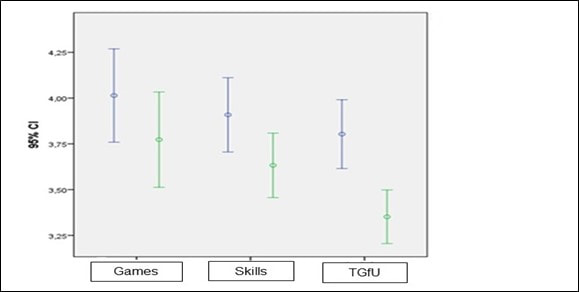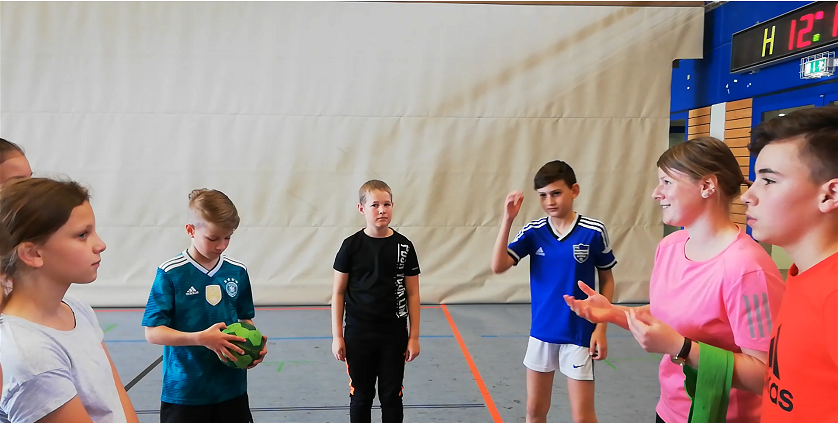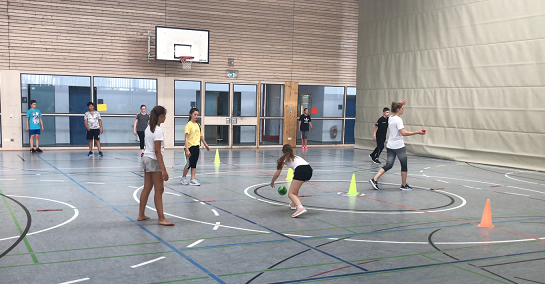University of Education, Weingarten (Germany)
Email: [email protected]
ORCID: http://ORCID.org/0000-0002-7851-1973
Researchgate: https://www.researchgate.net/profile/Stefan_Koenig6
Google Scholar profile: https://scholar.google.com/citations?user=IQ44XRMAAAAJ&hl=de
In general, we know that the state of the art shows various results on the effectiveness on TGfU vs. skill oriented teaching. However, a rather contemporary study by Allgäuer et al. (2016) which was conducted in a variety of secondary school classes in Germany, rather clearly presents that TGfU programs were more effective than skill and game oriented approaches in physical education. In this examination skill oriented teaching means that the students exclusively have to deal with drills on specific skills, whereas game oriented approaches refer to programs, which confront students mainly with small-sided but specific games of different complexity. Thus TGfU is to be regarded as a kind of combination of the two. Figure 1 shows the different effects in a quasi-experiment conducted with handball, volleyball, and soccer programs: Classes being taught on the basis of TGfU principles reached better learning results in all games.
Various studies analysing TGfU lessons and the question in how far students like or dislike such programs, brought to light that the majority of German students actually appreciate their teachers working the TGfU approach. In particular, this could be shown for 1 to 4 graders (7 to 11 years of age) who reported that TGfU lessons were interesting for them, that they felt like playing or taking part in the games all the time, and that they would prefer playing like that more often.
2) What is the situation in PE teacher education in Germany?
Due to a change in pedagogical conceptions and ideas, curricula in Germany have moved from the idea of prescribing traditional sport disciplines for PE to a paradigm which is more open because it only mentions movement fields, e.g. like playing. As a consequence, teacher education has also been modified; this means that lectures and seminars at university increasingly have to handle this challenge–a process which lead to more unspecific courses (e.g. racket sports) or to combination courses (e.g. basketball & volleyball). As a consequence, it might be assumed that future teachers will lack specific knowledge, a highly relevant goal for teaching TGfU lessons.
3) What are the most important problems for PE teachers in Germany?
Discussing strategies for teaching games in Physical Education a majority of teachers mention the following problems as focal:
- First, teaching in various pitches simultaneously, it is difficult, especially for beginners, to control the teaching process of all students. This leads to uneasiness.
- Second, recognizing typical and adequate game situations for reflecting tactical problems and questions (step 2 of TGfU process) seems to be an enormous challenge which requires teaching experience. Thus, it becomes a nearly unsolvable problem for novices.
- Third, conducting talks with students on the basis of a constructivist approach overcharges a great deal of teachers because they have not learned to do this, and because they aim at controlling the situation thus drawing the attention to themselves.
4) What could be done to improve the situation?
In general, our binational project (http://www.tgfu.info/whats-happening-in-germany.html) revealed three major consequences for teacher education (Baumberger et al., accepted): PE teachers need …
- .... specific TGfU teaching experiences which emphasize the typical combination playing and exercising,
- .... adequate teaching programs for different team sports and different age groups, and
- .... a framework for planning their game teaching on the long run.
Allgäuer, D., Brielmayer, D., Lutz, M., & König, S. (2016). Spielvermittlung in der Sekundarstufe I – eine Frage der Methode? [Teaching games in secondary schools–an issue of the method?]. sportunterricht, 65(10), 295–300.
Baumberger, J., König, S., & Bislin, S. (accepted). Sportspielvermittlung: Gelingens- und Mißlingensfaktoren [Teaching Games–Factors for Success and Failure]. SportPraxis.
Bunker, D., & Thorpe, R. A. (1982). Model for the teaching of games in secondary schools. Bulletin of Physical Education, 37, 5–8.
Memmert, D., & König, S. (2007). Teaching Games in Elementary Schools. International Journal of Physical Education, 44(2), 54–66.





